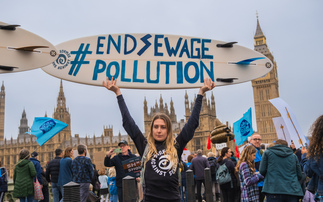The UK government has today provided a major boost to the country's clean energy sector, confirming long awaited plans for a fresh round of renewable energy project support and launching a consultation on its promised phase out of unabated coal power.
As green business leaders digest the implications of a Trump presidency for global decarbonisation efforts, the UK today reaffirmed its commitment to its domestic climate goals confirming £730m of annual support will provided to renewable electricity projects over this parliament.
Ministers confirmed the next round of the Contracts for Difference (CfD) auction, which provides guaranteed price support for clean energy generators, will start next April.
The Department for Business, Energy and Industrial Strategy (BEIS) said companies will compete for £290m worth of contracts for renewable electricity projects.
The auction will result in enough renewable electricity to power around one million homes and reduce carbon emissions by around 2.5 million tonnes per year from 2021/22 onwards, BEIS said.
The government also expects the auctions to push down the price of clean power, noting that the maximum price for offshore wind projects is now 25 per cent lower than was set for the last auction, and a competitive auction could bring that price down further.
The long awaited announcement comes on the same day as the government launched a consultation on its plans to end the use of unabated coal power in the UK by 2025 at the latest.
"We're sending a clear signal that Britain is one of the best places in the world to invest in clean, flexible energy as we continue to upgrade our energy infrastructure," said Business and Energy Secretary Greg Clark in a statement. "This is a key part of our upcoming Industrial Strategy, which will provide companies with the further support they need to innovate as we build a diverse energy system fit for the 21st century that is reliable while keeping bills down for our families and businesses."
In addition, the government also launched a consultation asking for views on whether onshore wind farms on remote islands off the coast of Scotland should be treated differently to onshore wind farms on the mainland. Developers have argued Scotland's islands provide a great wind resource that could deliver wind farms at a lower cost than offshore projects, but development is hampered by the cost of grid connections.
The proposals were broadly welcomed by green business groups and NGOs, who had voiced warnings that clarity on the coal phase out plan and next round of renewables investment was urgently needed to stop the UK falling down the international rankings for attracting clean energy investment.
The move to implement a coal phase out in particular was welcomed by a swathe of green commentators ranging from international diplomats to academic experts.
Laurence Tubiana, French climate ambassador and UN climate champion at COP22, said the UK's phase out of coal power should be welcomed as a "clear signal of international climate leadership".
"As unprecedented support for the Paris Agreement demonstrates, action to address climate change is both global and unstoppable," she said in a statement. "As the first major economy to manage the end of coal power, the UK is demonstrating it wants to stay at the forefront of this change. It's important that it maintains the pace and uses the opportunity to work to bring others with it. I am confident it will."
Her comments were echoed by former UN climate chief Christiana Figueres, who congratulated the UK government on the scale of its ambition. "Coal needs to take its rightful place in history of yesterday," she added. "Coal workers need to be given a fresh chance at the jobs of tomorrow."
Closer to home, Professor Michael Grubb, professor of international energy and climate change policy at UCL, said the decision will give investor confidence in the UK energy sector a significant boost. "Outlining how and when coal plants will cease to operate will pave the way for new investment, including gas," he said in a statement. "Coal is already struggling economically and removing coal clarifies the market space for gas during the 2020s. Overall reinforcing the existing commitments and clarifying mid-term plans increases investor confidence, so certainty on coal-phase out will help to bring forward new and cleaner capacity."
The clarity on the timings and structure of the next Contracts for Difference auction was also welcome relief to the offshore wind industry. RenewableUK's chief executive Hugh McNeal said the announcement will unleash "significant investment" in the sector. "The competitive auction process is continuing to drive down the cost of offshore wind energy at an unprecedented speed," he said in a statement. "British supply chain companies are already seizing the massive economic opportunities offered by offshore wind - and there's great potential for further job creation by innovative companies throughout the UK as the industry continues to grow."
However, McNeal expressed disappointment that although the government set a strike price for wave and tidal energy, it did not set a minimum level of deployment for which money will be specifically allocated. "We will continue to work with government to find a way forward for the UK"s innovative wave and tidal energy industries, but we're disappointed that no minimum level of deployment has been set for them," he said. "These ground-breaking technologies can replicate the cost reduction we're seeing in offshore wind and deliver industrial benefits to Britain. We can't risk falling behind and handing our global lead to other countries."










